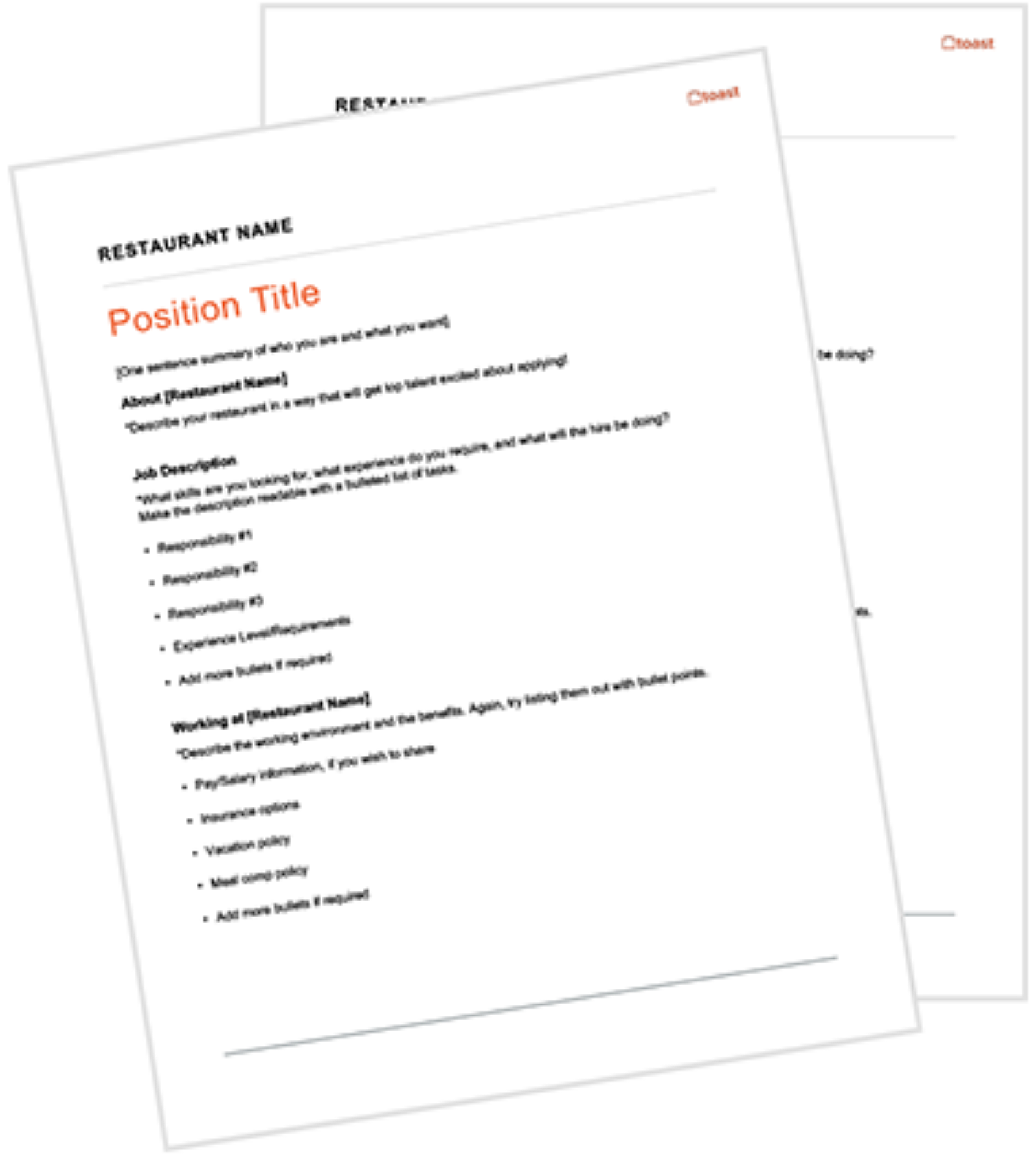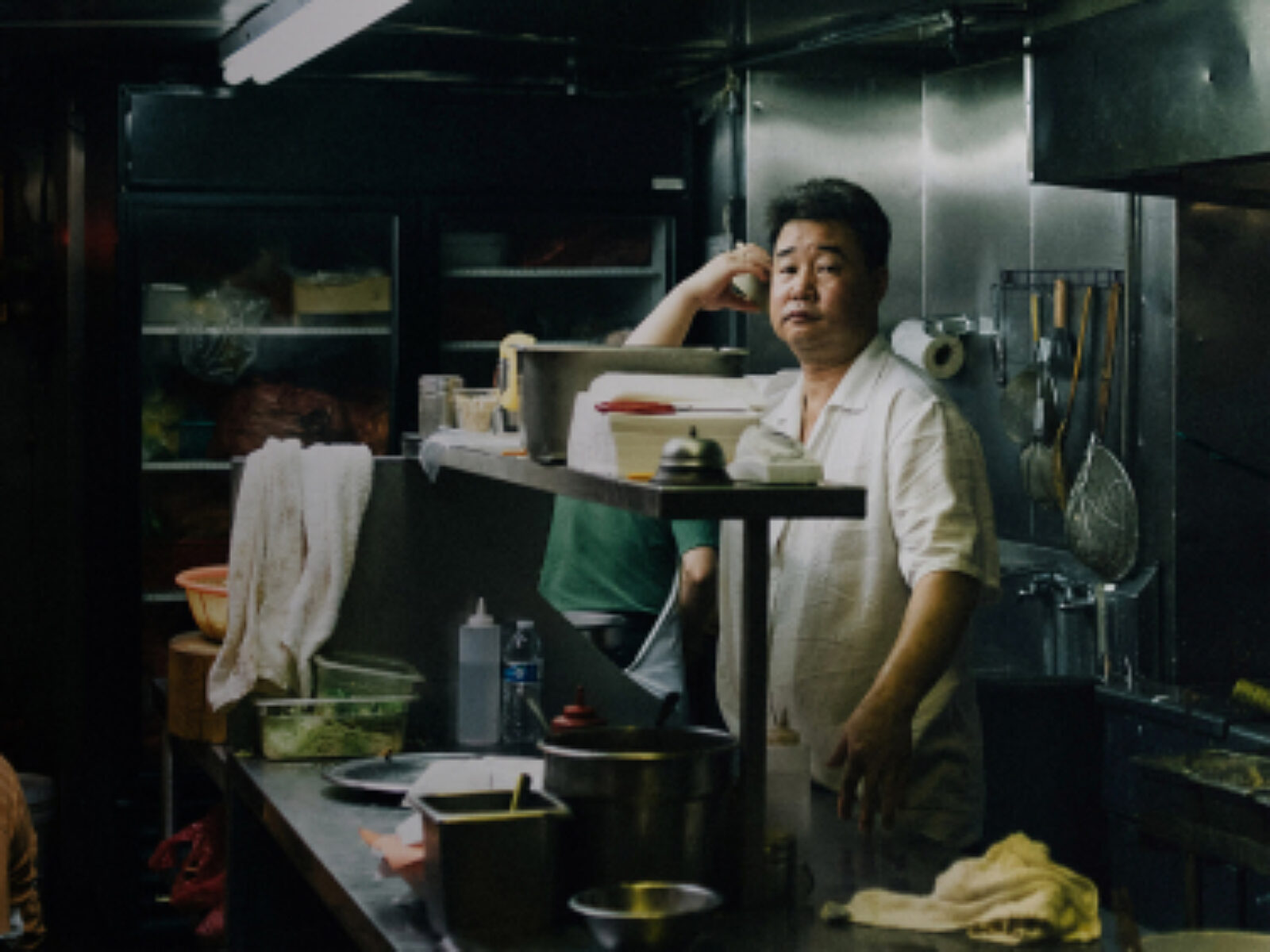
How to Conduct an Interview for a Restaurant Management Role
Hiring a great manager can change the entire dynamic of your restaurant. Here are 11 great questions to ask during a restaurant manager interview.

Cameron OlshanskyAuthor


Interview Questions Template
With culture questions, experience questions, and situational questions, this customizable Word doc will guide your interviews with prospective candidates.
Get free downloadDid you know that the average tenure for a restaurant manager is approximately four months and four days? With this frequency of turnover, restaurant owners, general managers, and even floor managers must constantly be ready to interview candidates for managerial roles in their restaurants.
We’ve all been through the interviewing process, and there’s no denying that it’s taxing on everyone involved. When assessing potential candidates, there’s a lot to consider. According to 7Shifts, there are seven general competencies included in a restaurant manager’s job: staffing, accounting and finances, inventory management, scheduling and payroll, marketing and advertising, customer service, and operations. Additionally, there are six responsibilities not found explicitly in the manager job description, but still paramount to the role: employee retention, human resources, general maintenance, tech oversight, ongoing education, and innovation.
Clearly, you have to keep your eye out for a lot of things when looking for your ideal fit. You can fortunately get at all of this information and more by asking the right questions — the interview provides an opportunity for connection and a chance to start building a relationship with a potential employee.
For that reason, we've compiled 11 examples of restaurant manager interview questions that will help you identify the best fit for your restaurant’s needs.
And if you’re still feeling a little lost in your hiring process, check out our guide to hiring the perfect manager, which covers everything you need to know about what to look for in your hiring — and how to find it.
Interview Questions Template
With culture questions, experience questions, and situational questions, this customizable Word doc will guide your interviews with prospective candidates.

Interview Tips
Before we dive into interview questions, consider these helpful tips!
Use Your Time Wisely
One difficult part about interviewing is having a very limited amount of time to get to know each candidate. How are you supposed to know if the candidate is a good fit after chatting with them for only an hour? Truly getting to know someone can take quite some time, so it’s crucial to use the time you have with each candidate wisely.
Before the interview even begins, you should have some idea of the type of candidate you want to hire. Think about the culture of your restaurant and team to help you decide what type of person you’re looking for. During the interview, look out for personality traits that match your ideals.
Once the interview begins, some light chitchat is standard and will help both you and the candidate feel more comfortable. This sort of banter is presumably going to be part of their job, so make sure they can carry a conversation with ease. After a few minutes of small talk, transition into the more formal part of the interview, making sure to ask your most important questions first — that way, if you run out of time and don’t get to ask all the questions you had lined up, you'll still be able to make an informed decision regarding next steps.
Pay Attention
Make sure you’re listening thoroughly to the responses to each question and paying attention to the interviewee’s body language. Candidates should answer questions with original responses that demonstrate their past experiences, and should seem engaged and excited to be talking with you. Remember that, during this time, the interviewee is also making sure they want to work with you. If they don’t seem like they are also vetting you and your restaurant, they may not be your best bet.
Be Prepared
Study the candidate’s resume ahead of time. Don’t waste time asking them to run through the professional highlights on their application when you could be asking additional questions about their multi-tasking skills. This goes back to using your time wisely — if you have an understanding of the candidate’s general background beforehand, you can be more efficient with your time and ask more targeted questions about their history.
Restaurant Manager Interview Questions
1. Tell me about yourself.
A rich answer to this question will give insight into personal interests as well as professional goals. Understanding a person’s hobbies, personality traits, and ambitions will also determine how they’ll mesh with the rest of the team and restaurant guests. This question should be a no-brainer — if the candidate is struggling to tell you about their interests, or even seems to be reading off a script, they may not be personable enough to manage your staff.
2. It looks like your longest tenure at one restaurant was X. What made you stay that long?
This question will likely cover a person’s commitment to their role and, more importantly, the business. It also identifies what someone looks for in a role and why they might be a good fit at one restaurant over another. This is an easy way to gauge what your candidate prioritizes regarding workplace culture, and allows you to assess if your establishment would fit in with their preferences.
3. What drove you to look for a new opportunity?
Ideally, the answer to this will shed light on an individual’s desire for growth, showing their ambitions and forward thinking. It’s not uncommon for this question to lead to a discussion about the relationship between the candidate and their former supervisors.
Your candidate should speak to the positives of their previous positions, rather than the negatives. Instead of listing things they didn’t like about their former boss, your interviewee should talk about management styles that help them be a better employee. If the candidate has nothing but unfavorable things to say about their previous establishment, it’s likely they will do the same in your restaurant.
4. What was your role in budgeting and finances in your last position?
This response should dig deep into the importance of monitoring labor against revenue and, of course, inventory. A detailed answer to this question ensures that the candidate has an understanding of the goals of any restaurant operation, and of the impact of their role on successful business decisions.
If the candidate doesn’t have budgeting experience, look for answers that focus on their eagerness to learn — you can teach budgeting to someone with a great attitude if they’re enthusiastic about developing new skills.
5. Tell me about a time you had a positive impact on your previous restaurant. What did you do differently?
Was there a situation where the candidate increased the bottom line or decreased labor costs without losing an employee?
This question can be very telling, especially if your restaurant has specific goals or areas you’re trying to address. It’s also a great way to determine if your candidate takes initiative and is comfortable voicing their opinion to positively impact your restaurant.
6. Tell me about the last team you led. What was the dynamic like? Did you hit your goals? How did you handle staff conflicts?
It’s vital to understand the relationship a restaurant manager had with their past employees, because employee performance directly affects the customer experience.
The way a candidate answers this prompt can trigger a million smaller questions about their effectiveness as a manager. Say, for instance, they describe being great at conflict resolution. The hiring manager can then ask questions about managing conflicting personalities, employee retention, etc.
If the interviewee hasn’t had direct leadership experience before, they should still be able to talk about how they’ve exemplified leadership among their peers. In many cases, being seen as a leader among peers says a lot about a candidate because it shows that even without a title, they’re able to garner respect.
7. As the saying goes, the customer is always right. Tell me about a time where you knew the customer wasn’t right, and how you dealt with it.
Providing a positive, diplomatic answer here shows a level of professionalism that is required when communicating with restaurant customers — unruly and otherwise.
A restaurant manager is someone who is composed, understanding, and empathetic to guests, regardless of the situation. Anything less should not be tolerated.
8. Tell me about a rockstar employee you had on your team.
This should be a direct reflection of the expectations that this person holds not only for the rockstar on the team, but for the entire team.
Plus, it's also good to note the candidate's demeanor in their response. Observe the pride they exude when speaking highly of someone on their team. If it's not there, the candidate may not care enough about the position or restaurant.
9. Tell me about your experience recruiting employees for your team.
When talking about hiring new employees, look for an answer that shows a record of high standards. What kind of people does the candidate look for, and are their standards in line with your restaurant's goals?
Because of the high turnover rate in restaurants, it can sometimes be tempting to hire any able-bodied person to work the floor or the line. But it’s important to hire for quality, not quantity, especially in a management role; an answer that emphasizes this philosophy is a must.
Keep in mind that these questions can all be adapted based on the previous experience of your candidate. Give them opportunities to speak to their strengths in their prior roles, even if they don’t fit within your questions. Here, you can explore ideas of how they could help with recruiting, even if they’ve never done so before.
Employee Handbook Template
Outline your restaurant’s staff policies in this customizable Word doc to help restaurant management and staff get on the same page.

10. What are some areas of improvement for this restaurant, and what do you think we do well today?
Needless to say, this question will weed out candidates who haven’t prepared for the interview by researching your restaurant. If they've never actually looked into your restaurant, why do they want to work for you and how do they know they'd enjoy it?
Beyond that, this question provides the opportunity to showcase how the candidate gives constructive feedback. Someone who glosses over areas of improvement is probably passive — not a great quality in a manager. Instead, you’re looking for someone who is direct and unafraid to offer up ideas. This question also opens the discussion up to areas that could be influenced by a new manager.
11. What questions do you have for me?
This one's a given.
A candidate for a restaurant manager position should always have questions. If a candidate is truly interested in a role and organization, they will be naturally curious to learn all that they can. As an interviewer, you should interpret a candidate’s curiosity as passion; questions also ensure that the candidate understands the nature of the role completely.
Expect questions like: What’s the restaurant culture like? What’s the persona of your most frequent diner? How do you handle competition in the industry?
Other Necessities for the Restaurant Manager Interview
Don’t forget to get the transactional interview questions out of the way as well. These are questions about salary requirements, scheduling, availability, and other logistics. Asking these questions early on is helpful in determining the direction of the rest of the interview. If the expectations don’t line up, be up front about it from the beginning so that there’s no surprises at the end.
Additionally, don’t be afraid to trust your instincts when hiring. You know your staff and your restaurant better than anyone, so if you think someone will be a good fit but they don’t have the exact amount of experience you had in mind, trust your gut. Use the method that Stephen Darwin, owner of Darwin’s Ltd., uses when considering candidates: “If somebody’s willing, we can train them how to do just about every job that needs to be done. You can't train personality. You can't train manners. You can't train social skills. Sure, you can to a degree. But people either have it or they don't. And it's usually really obvious.” Unsure if you should trust Stephen’s hiring model with your own restaurant? Companies like Southwest, Google, Apple, and The Four Seasons also use this strategy when hiring.
If somebody’s willing, we can train them how to do just about every job that needs to be done. You can't train personality. You can't train manners. You can't train social skills. Sure, you can to a degree. But people either have it or they don't. And it's usually really obvious.
Stephen Darwin
Owner of Darwin's Ltd.
Hiring the right manager for your restaurant can feel like a daunting task, but if you prepare adequately and look for a great cultural fit over someone with loads of experience, you’ll find the right employee and make sure goals are met, your restaurant is run smoothly, and staff are happy to come to work.
Related Resources
Is this article helpful?
DISCLAIMER: This information is provided for general informational purposes only, and publication does not constitute an endorsement. Toast does not warrant the accuracy or completeness of any information, text, graphics, links, or other items contained within this content. Toast does not guarantee you will achieve any specific results if you follow any advice herein. It may be advisable for you to consult with a professional such as a lawyer, accountant, or business advisor for advice specific to your situation.
Read More
Subscribe to On the Line
Sign up to get industry intel, advice, tools, and honest takes from real people tackling their restaurants’ greatest challenges.



